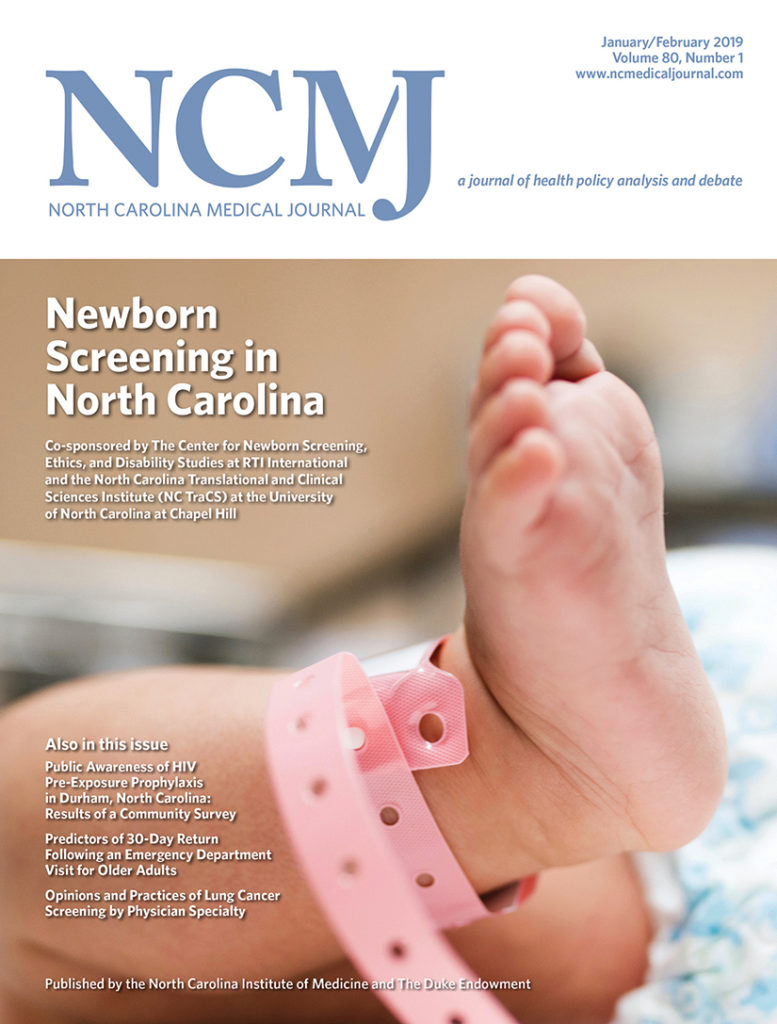


More than 150 million babies in the United States have been screened for critical health problems soon after birth, and many of their heel stick samples have been analyzed using technology created right here in North Carolina.
Donald B. Bailey, Jr., director of the Center for Newborn Screening, Ethics, and Disability Studies at RTI International, and Scott J. Zimmerman, director of the North Carolina State Laboratory of Public Health, served as co-guest editors of the latest issue of the North Carolina Medical Journal, which focused on newborn screening.
The issue celebrates North Carolina’s pioneering influence on the field, which can save the life of a child with a potentially fatal illness before he or she shows any symptoms. Authors describe the history of newborn screening, explain the process of of taking a heel stick and conducting genetic testing, and look forward to the opportunities and challenges that lie ahead.
Click on the links below to read the articles in this issue, and feel free to engage with the authors – and with us – on Twitter as we discuss this topic over the next several weeks.
The Future of Newborn Screening: Why and How Partnerships Will be Needed for Success by Donald B. Bailey, Jr. and Scott J. Zimmerman
“Newborn screening in North Carolina has been highly successful, identifying newborns with health conditions for which time-sensitive treatments must be provided to reduce morbidity and mortality…Here we highlight some of the major challenges that newborn screening will almost surely face in the coming years.”
What is Newborn Screening? by Cynthia M. Powell
“A successful newborn screening program requires skilled effort, understanding, and collaboration by many individuals, from those collecting the blood spots to the child's primary care provider and family.”
Newborn Screening Follow-up by Lara Percenti and Ginny Vickery
“Follow-up links the laboratory result with physician action. Timeliness is essential to ensure affected babies receive treatment and enjoy a healthy and productive life. The follow-up process comprises many steps, several disciplines, and various challenges.”
The Role of the Genetic Counselor in Newborn Screening by Gail Marcus
“As part of their role in providing follow-up, public health genetic counselors play a central part in creating and choosing educational materials for parents and providers.”
Newborn Screening Policy Decisions: Adding Conditions by Scott M. Shone
“Recent changes in state laws, including in North Carolina, are intended to streamline the decision-making process for newborn screening policy changes.”
Recognizing 50 Years of Innovative Newborn Screening in North Carolina by Lou F. Turner, Sara Beckloff, and Ann Grush
“The role and scope of newborn screening is ever expanding. While traditionally it was only concerned with a few inborn errors that led to intellectual handicap, the North Carolina newborn screening program now includes disorders that can cause premature death, immune deficiency, hearing disorders, and heart problems.”
The Role of Technology in Newborn Screening by David S. Millington
“This commentary traces the expansion of newborn screening for inherited metabolic disorders during the past 55 years, from the first simple test for phenylketonuria to the current panel of over 35 conditions.”
Lessons Learned from Newborn Screening in Pilot Studies by Jennifer L. Taylor and Stacey Lee
“This commentary discusses the importance of conducting newborn screening pilot studies in North Carolina and the lessons learned from performing three pilots for severe combined immunodeficiency (SCID), mucopolysaccharidosis type I (MPS I), and X-linked adrenoleukodystrophy (X-ALD).”
SCID: A Pediatric Emergency by Rebecca H. Buckley
“Severe combined immunodeficiency (SCID) is a syndrome of diverse genetic cause characterized by an absence of T cells, resulting in a profound deficiency of adaptive immune function. This condition is uniformly fatal in the first two years of life unless immune reconstitution can be accomplished.”
Early Check: A North Carolina Research Partnership by Lisa M. Gehtland and Donald B. Bailey
“Newborn screening programs rely on understanding the benefits and harms of screening, but the rarity of conditions hampers generation of high-quality data. The Early Check study, a partnership between North Carolina nonprofit, academic, and state organizations, is filling this gap by screening for conditions not included in standard newborn screening.”